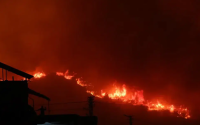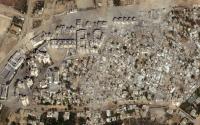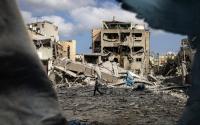Common Dreams / Published on Saturday, September 16, 2006 by the Toronto StarTim Harper
There was no Mission Accomplished banner, the venue was the U.S. Capitol not an aircraft carrier, and the president wore a business suit, not a Top Gun flight suit.
But the message was the same — victory had been declared. Prematurely.
Now, more than four years after George W. Bush trumpeted the liberation of Afghanistan in his 2002 State of the Union address, a resurgent Taliban is very much back in the game and Canadian troops are taking casualties in fierce fighting which many believe could have been avoided.
"We've handed off a mess to the NATO command, a mess which was totally preventable,'' says Brian Katoulis, an analyst with the Center for American Progress.
Whether a Bush administration with a limited attention span failed to finish the job in Afghanistan because of its obsession with Iraq is a matter of debate here, but there is a cruel irony for Canadian troops and policymakers.
Ottawa's commitment to Afghanistan was partly driven by its determination to stay out of Iraq, but the manner in which the Iraqi war has bled manpower and resources in this country has likely cost Canadian lives in Afghanistan.
With the reports back home focused on the grisly carnage of Iraq, Afghanistan for years here was known as The Forgotten War.
It is forgotten no more.
"This administration has picked the wrong fights at the wrong times, failing to finish the job in Afghanistan, which the world agreed was the central front in the war on radical fundamentalism, and instead rushing to war in Iraq, which was not a central front," said Senator Joe Biden, a Delaware Democrat who has signalled he will seek the presidential nomination in 2008.
"This administration, which is full of patriotic people, has dug America into a very deep hole — with very few friends to help us out."
John Kerry of Massachusetts, another potential 2008 Democratic candidate, said Afghanistan is the central front in the war on terror, but Bush is treating it like a "sideshow."
That view is not exclusive to Democrats. "We must confront the reality that we are neither where we wanted to be nor where we need to be," former Republican House speaker Newt Gingrich, who is also mulling an '08 presidential bid, told an American Enterprise Institute seminar this week.
"We have not defeated the Taliban in its sanctuaries in northwest Pakistan. Neither Afghanistan nor Iraq is stable and secure."
It was very different when Bush, with an eye on a looming attack in Iraq, celebrated the toppling of the Taliban in 2002, before legislators and visiting Afghan Prime Minister Hamid Karzai.
"The American flag flies again over our embassy in Kabul," Bush said at the time. "Terrorists who once occupied Afghanistan now occupy cells at Guantanamo Bay. America and Afghanistan are now allies against terror."
Sixteen months later, he would touch down in a fighter jet on the USS Abraham Lincoln to proclaim Mission Accomplished in Iraq.
Now, Iraq is on the cusp of civil war, a resilient Taliban is battling Canadian, American and NATO troops and more than 150,000 Americans are still fighting in the two countries.
Some 276 Americans have lost their lives in Afghanistan, 2,674, or almost 10 times than number, in Iraq.
Afghan heroin is also now flooding the European market because the opium crop has come back with a vengeance.
Katoulis points out that the U.S. has trained an Afghan security force of fewer than 100,000 while about 250,000 Iraqis have been trained.
"We provided a vacuum which was filled by the Taliban and even when we saw problems looming, we didn't know what to do because we really had no strategy outside of Kabul," he said.
William Nash, a retired U.S. army general who has served in Iraq, Bosnia and Kosovo, said the U.S. never committed enough troops in Afghanistan and never tried to disrupt the Taliban sanctuaries.
But, said Nash, now an analyst at the Centre for Foreign Relations, there has not been enough political and economic progress under Karzai to convince Afghans that they were better off than under the Taliban.
And, he said, the Taliban is ruthless.
"We never finished the fight,'' he said. "But could today's situation be avoided? I wouldn't go that far, but it could certainly have been mitigated to a great degree."
Michael O'Hanlon, an analyst with the centrist Brookings Institution, said there was clearly a shortage of U.S. troops and properly trained Afghan soldiers, but not all the blame can be laid at the feet of Bush.
"As much as we appreciate the effort of the Canadians, the French, the Germans and others who did not support the Iraq war," O'Hanlon said, "it is only now that the NATO contribution is approaching the U.S. force size in Afghanistan. These are countries with a combined population and combined military larger than the U.S., and they are not preoccupied with Iraq.
"I think some of the blame has to rest with the allies."'
John Pike at globalsecurity.org — while acknowledging that Canada and its NATO allies have been handed a mess — does not lay the blame with U.S. military planners.
"This mess was really of the Taliban's making,'' Pike said.
"For someone to say it turned into a mess because of U.S. neglect, because Washington was too focused on Iraq, that's just a talking point.
"It's a sentence, but you can't complete the paragraph because you can't explain what the U.S. mistakes were."
Yes, Pike says, the U.S. reallocated some of its special operations forces from Afghanistan to Iraq, but he doesn't believe that made a huge difference. "Afghanistan may have been under the radar in Washington, but it wasn't under the radar for the U.S. military," he says.
When Bush addressed the nation on the anniversary of the Sept. 11 attacks, he barely mentioned Afghanistan, the source of the attacks five years earlier.






